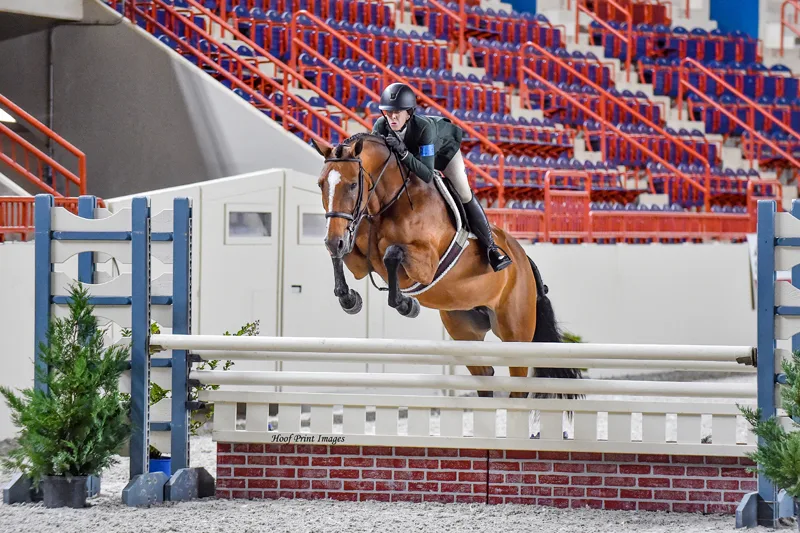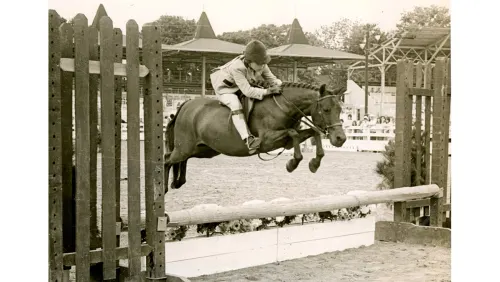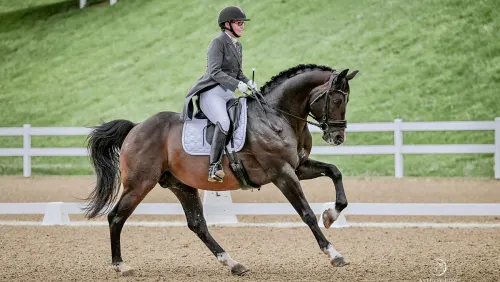In June 2018, Kelly Ross’ morning began like any other. Moving slowly, as she was still recovering from a riding accident that left her with a broken pelvis and back, she began her morning routine in her house on Pine Bridge Farm in Vincentown, New Jersey. Outside, barn staff began bringing the horses in from turnout, and as they went to catch her mare L’Argent M, or “Blue,” from the paddock in her backyard she heard grooms calling out to each other, sounding upset.
“My mom came running in the door and said, ‘Blue’s blind,’ ” Ross remembered. “She’d always been healthy.”
Blue hadn’t come to the gate like usual, and the groom found her with her eyes bugging out, standing still as a statue.
“When they got to her she was standing in the middle of her field, staring into space,” Ross said. “They walked up to her, wondering what was going on, because that’s not normal for her. She’s normally an in-your-pocket type, and you can call her and she’ll come up to you. When they got to her, she was like a deer in the headlights. They got her halter on her, and she was running into them. She didn’t steer. She didn’t want to walk.”
There were no marks on the mare, then 8 years old, but she refused to come inside. Ross immediately called her veterinarian. Blue was blind, all right, but no one could quite figure out why. Ross’s veterinarian administered dexamethasone, and three days later, Blue’s vision returned. Ross switched her from night turnout to a few hours in the daytime and found her a rescued miniature horse named Matilda to keep her company.
Ross had picked Blue out of the field she was born in at Maggie Fullington’s Marabet Farm in Palm Beach Gardens, Florida, with hopes of one day competing in the amateur-owner hunters. Things were going well so far—they’d had success in the baby greens, and although they’d struggled with lead changes, she felt they were going in the right direction.
A month after the first incident, Blue’s eyesight disappeared again, but just in the left eye this time. Ross hauled her to Mid-Atlantic Equine Medical Center (New Jersey), where initial diagnostics led veterinarians to suspect that a tumor might be to blame. Blue was referred to the Cornell University Equine Hospital (New York) for further evaluation.
There, a team of veterinarians performed a computed tomography scan on Blue’s skull and revealed a mass growing in a sinus cavity, under her brain and in front of her pituitary gland. Veterinarians couldn’t determine from the scans whether the mass was a hematoma, neoplasm or a cyst, but it was in a very precarious position and was the size of a golf ball.
ADVERTISEMENT
“Cyst and tumor in the sinus immediately underneath the brain and in front of the pituitary gland [Spenopalatine sinuses] are rare,” said Dr. Norm Ducharme, DMV, MSc, the lead surgeon on Blue’s case. “Even more rare is when they extend into the adjacent brain. Because of the position of the optic nerves at the base of the brain, blindness can also be part of the clinical picture.
“Because of the location of Blue’s cyst/tumor, we had to develop a variation of a new approach that we had used once or twice before for a different tumor type—and it had to be done in steps because of bleeding.”
Blue underwent two surgeries—a five-hour standing procedure that was cut short due to excessive bleeding, and a seven-hour operation that went on late into the night. The mass’ position in Blue’s head made it hard to access already, but if it had begun to enter the brain, veterinarians told Ross there would be nothing they could do.
Ducharme’s prognosis for the mare was guarded.
“We did not know if she would develop any secondary ascending infection to the meninges, optic nerves, and we did not know how much of her neurological deficits she would recover from,” said Ducharme.
Ross was happy just to have her horse back after Blue’s discharge.
The mare came home with her head bandaged up, and the biggest challenge was getting the surgical wound to close completely. She still has no vision in her left eye. Ross planned to retire the Hanoverian as a breeding prospect, but Blue adjusted to her new vision well, without so much as a lingering head tilt, so Ross began entertaining the idea of riding her again.
When she settled back in the saddle, Ross found certain motor skills that had been challenges before were suddenly easier.
ADVERTISEMENT
“She could always jump a beautiful course, but she couldn’t do a lead change,” said Ross of Blue’s training pre-surgery. “She did well in the baby greens, and then after that we just couldn’t get the changes. From the time she went back to work, she’s had an automatic lead change. It all just came together. It’s almost like she knew we were telling her to do this, but she couldn’t physically do it.
“[The mass] had to have been quite irritating for quite a long time, which just goes to show she was a saint of a horse.”
Blue has no head shyness and has developed no spook or fear of busy environments. She even lies down in her stall at horse shows to doze while Ross undoes her braids.

After the mass was removed from L’Argent M’s sinus cavity the mare came back to the show ring. Hoof Print Images Photo
In April last year, they competed in the schooling hunters at Four Seasons (New Jersey) and moved up to the amateur-owner hunters in July.
This year though, it’s Blue’s turn to pay Ross back for her patience and diligent caretaking. In December, Ross suffered a serious traumatic brain injury when a loose horse knocked her down and trampled her while she was standing in the breezeway of the indoor arena at Pine Bridge. As she continues her recovery, she’s still not sure what her timeframe could be for returning to the saddle, or how much training she’ll be game for when she comes back. She does know which horse she’ll be aboard, though.
“That’s the joke, we keep saying we have to tell my doctor it’s not a normal horse I’m getting back on—she’s blind in one eye,” chuckled Ross. “But she’s the only horse I want to ride because I know I’m safe with her.”
Do you know a horse or rider who returned to the competition ring after what should have been a life-threatening or career-ending injury or illness? Email Kimberly at kloushin@coth.com with their story.
















